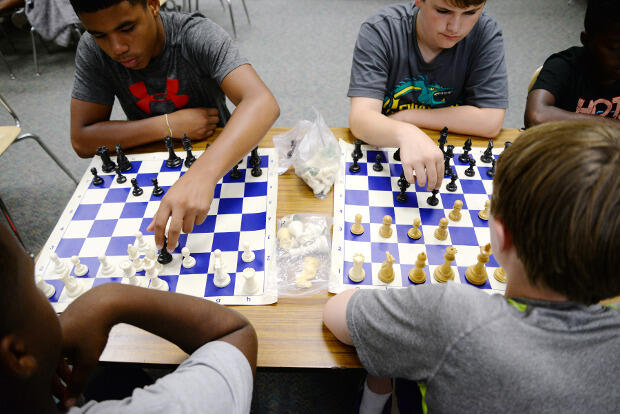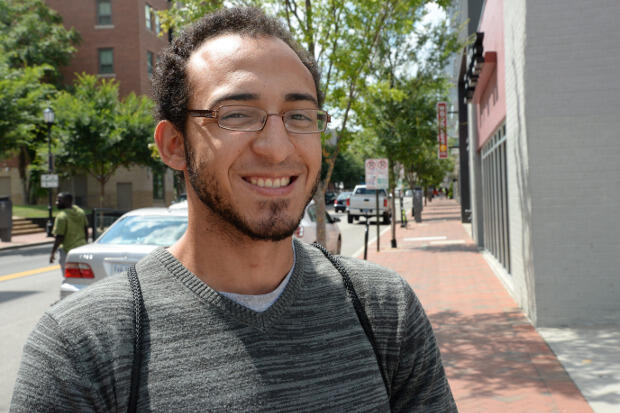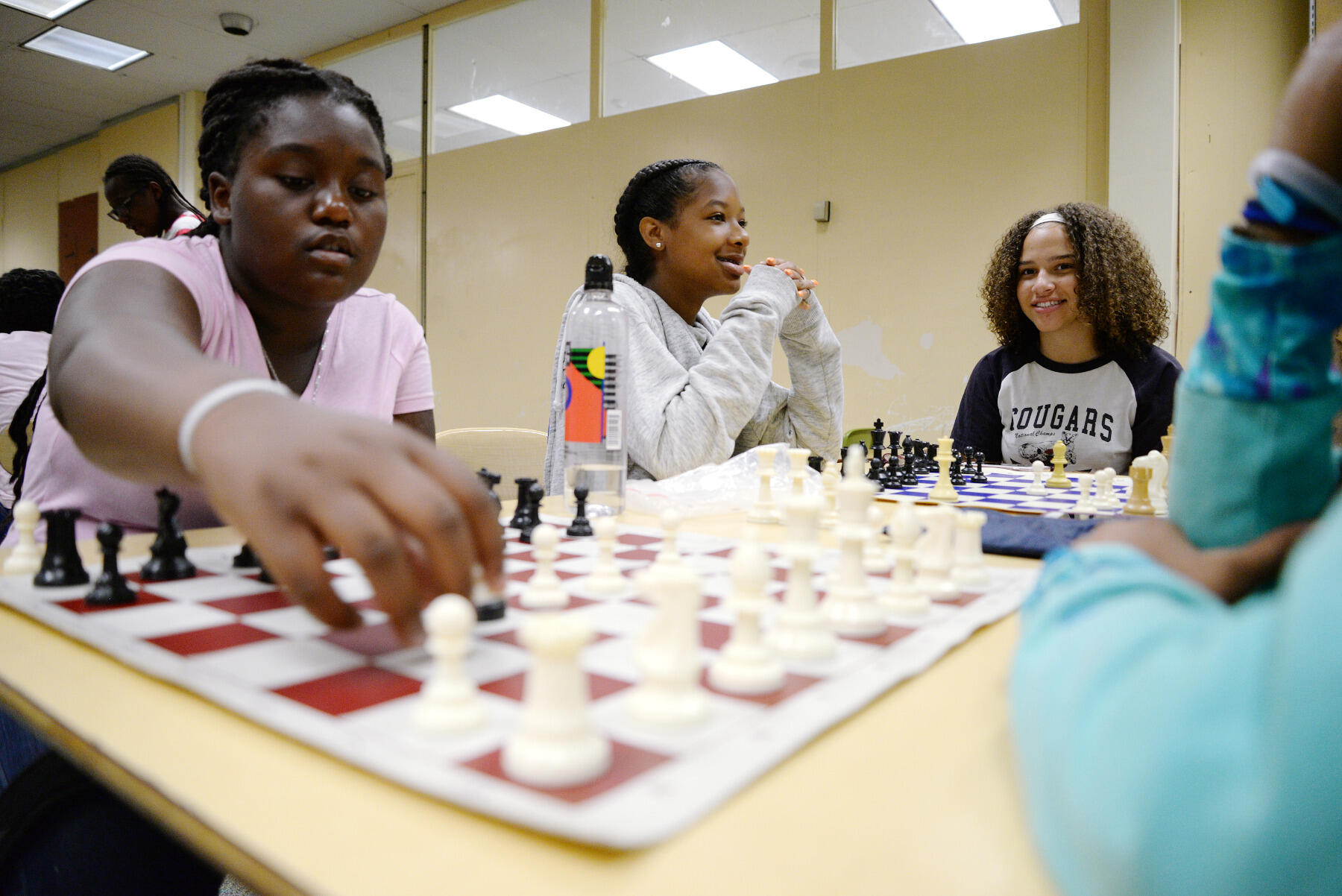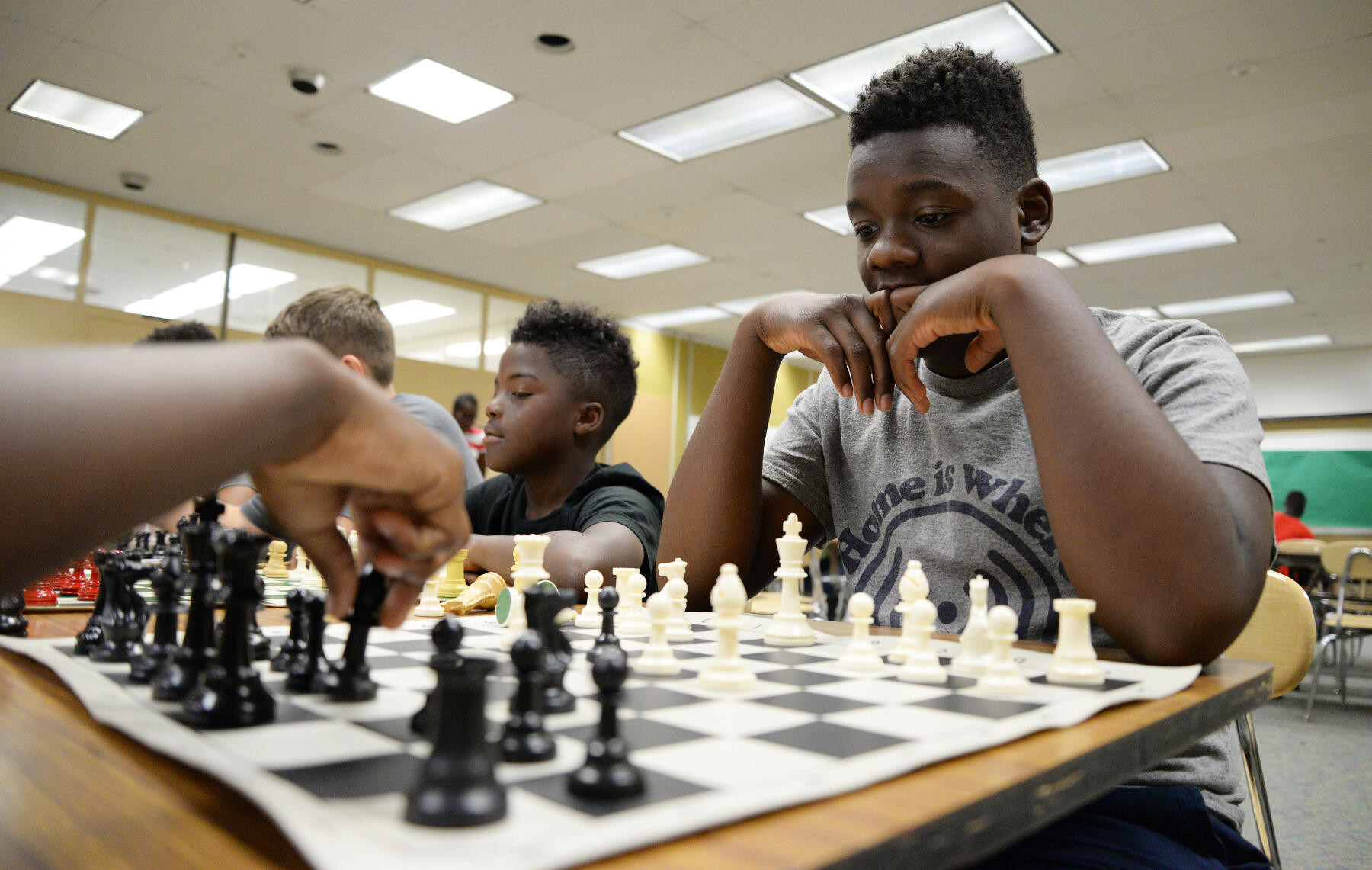
<br>Photos by Brian McNeill, University Public Affairs
July 31, 2017
Organization co-founded by VCU student teaching chess, patience to Richmond youth
Share this story
In a Henderson Middle School classroom, dozens of Richmond children between the ages of 12 and 14 are paired off, each huddled over chess boards and playing intensely.
“Chess helps me think,” says Avery White, 12, a student at Falling Creek Middle School. “It’s a very patient game. It helps you think a few steps forward because if you make a wrong move, your opponent can get an advantage on you.”
The students were participating in a chess program run by Legacy Chess Academy — an organization co-founded by Virginia Commonwealth University senior Corey Hancock — and offered as part of the Richmond Police Athletic League’s summer program for Richmond youth.

Legacy Chess grew out of a neighborhood chess club, the Henrico Chess Club, which Hancock, a psychology major in the College of Humanities and Sciences, and JaVonne Bowles launched in 2013 while they were students at J. Sargeant Reynolds Community College.
The idea, Hancock said, was to bring people together to play chess and have fun and learn. Over time, the club began hosting tournaments and eventually started to branch out into offering private lessons and classes. The club soon grew into Legacy Chess Academy to reflect its growing ambition to bring chess deeper into the community by partnering with schools and organizations such as the Boy Scouts, local libraries and the Police Athletic League.
“We were and continue to be welcomed into the hearts of many students as it is most of their first time learning about the game,” Hancock said. “We are now proud to be an education organization that offers services to provide chess instruction, encourage student development, and build awareness to the community of the values the game has to offer.”
Legacy Chess hosts after-school programs in the Richmond area, provides group lessons and private lessons, and organizes tournaments.
“In teaching chess, our mission is for children to learn the values of patience, discipline, creativity, focus, and preparation,” Hancock said. “We hope for individuals to apply these values to their education and daily lives to assist them in what they deem as a successful life.”
Officer Perry Barber of the Police Athletic League said Legacy Chess has proven to be great part of RichmondPAL’s summer program.
“Legacy chess is an awesome organization, led by inspired go getters bringing a great game to many who would have never gotten the chance,” he said. “It’s been a fantastic partnership.”
Benefits of chess

Hancock first discovered the benefits of chess in the sixth grade. From preschool through elementary school, he was extremely shy and anxious, and had difficulty participating in class. In the sixth grade, however, he joined his middle school’s chess club.
“I remember walking in nervously and seeing a room filled with people, but I was simply following a friend around who wanted to join and I knew I was going to ignore anyone who spoke to me to avoid an awkward encounter,” he said. “To my surprise, I got through my first meeting without receiving much more than a ‘Hi.’ We had all sat down, shook hands, played our game, shook hands again and moved on. For the first time I felt like I had a connection with a stranger without even having to speak to them. This was huge. To me, anyway. And I didn't have to worry about a failing grade if I lost.”
Hancock kept attending the club’s meetings, and soon found himself attending chess lectures, teaching newer players and sharing ideas about the game.
“Next thing I knew, I was doing the same things in school,” he said. “The anxiety was still present, but I knew it was a feeling that would pass once I started speaking. I still jumped when I heard my name but I had the strength to rise to the challenge. Part of my problem was not knowing how to find an answer I didn't know or how to ask the right questions in my head and anticipate what may be asked of me. I learned that in chess.”
Chess, he said, requires the player to quickly sort through multiple scenarios and to constantly adjust what should be done next, asking questions such as: “Why did this move get played?" "What can be done now?" "How can this be broken down and made simpler?" "What do we already know and what do we need to find out next?"
“Questions like these teach us to prepare for anything,” he said. “The lessons I learned have opened many doors for me and have left me feeling capable of anything I set my mind to. Now I want nothing more than to duplicate that experience for other students.”
Teaching patience

Last week’s program at Henderson Middle School was led by Bowles, a certified yoga instructor who sought to explain the importance of controlling one’s breathing while playing chess, much like with yoga.
“Who has noticed how they’re breathing while playing a chess match,” she asked.
“You breathe really fast,” replied one student.
Bowles told the class that she likes to slow down and concentrate on her breathing during a difficult match, and finds that it re-focuses her attention on the game.
“If you’re able to slow down, take your time and take a few breaths,” she said, “you’ll be able to see the entire board and make the right move.”
For Bowles, she said, the best part of Legacy Chess is getting to see the impact the coaching and instruction often has on the students.
You can really see how they intuitively grasp that chess relates directly to your life.
“You definitely see progress,” she said. “For some, you see progress in how they play. In others, you can really see how they intuitively grasp that chess relates directly to your life.”
Carmella Szabo, a junior psychology major at VCU, is Legacy Chess’ executive coordinator, responsible for reaching out to schools, churches, libraries and other public organizations. She enjoys helping Legacy Chess grow, she said, because it is teaching a game that carries valuable lessons that will benefit young players beyond the chess board.
“I think the organization is very important for children to learn the disciplines playing chess teaches them such as focus and patience,” she said. “One of my main interests in psychology is learning about how the younger generations live for instant gratification. I see that when the children learn how to play chess they learn patience and strategy to get to where they want to be in the game.”
Subscribe for free to the VCU News email newsletter at http://newsletter.news.vcu.edu/ and receive a selection of stories, videos, photos, news clips and event listings in your inbox every Monday and Thursday during the academic year and every Thursday during the summer.
Subscribe to VCU News
Subscribe to VCU News at newsletter.vcu.edu and receive a selection of stories, videos, photos, news clips and event listings in your inbox.












